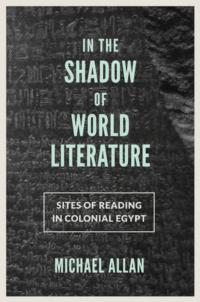Michael Allan’s groundbreaking new book In the Shadow of World Literature gives us one of the most moving and powerful…
In the Shadow of World Literature

World literature has commonly been understood as a collection of national or linguistic traditions (relating French, German, Russian, and Kiswahili literature, for example), and aesthetic periodization has tended to serve as a basic unit in literary history (distinguishing between Romanticism and modernism, for example). Michael Allan’s In the Shadow of World Literature proposes a different type of analysis, one that shifts attention from literary texts to the practice of literary reading and that considers the sensibilities, dispositions and behaviors cultivated by literary education.
With the rise of departments of modern literature, being literate comes to imply not only a linguistic competence with which to decipher words, but a particular way of relating to language, textuality, and critique, all of which come to be understood as aspects of reading properly. If we link world literature to the sensibilities it assumes of its readers, then how do we trace these sensibilities across differing textual practices and traditions? How does literary education reconstitute the distinction between literacy and illiteracy? Who or what determines what it means to read properly? World literature, Allan argues, is not the neutral meeting ground of a variety of textual practices, but instead a framework that asserts—and at times enforces—a particular place for literature in the world.
Drawing from the work of social scientists—who raise important questions regarding the relation between colonial institutions, religion, and knowledge production—and postcolonial literary scholars—who investigate how literature mediates the interactions between the colonizer and the colonized—In the Shadow of World Literature ultimately aims to bridge history, religion, and anthropology with literature and aesthetics, all in an effort to consider the contingent formation of a literary world in colonial Egypt.
In the discussion that follows, six scholars—from departments of comparative literature, English, Arabic, and religion—engage with questions and implications of Allan’s book.
Worlding with the Rosetta Stone
Throughout his study, Allan's sensitive attention to forms and practices transports us to the constitutive limits of world literature. Questions…
Criticism and catastrophe
Rather than a cosmopolitan space where all national literary traditions can finally cohabitate on an equal footing, world literature is…
Future fanatics of world literature?
While this future world literature is hospitable—more broadly, to aspiring critics, and, in a more specialized sense, to literary scholars…
The contested worlds of world literature
Reading Michael Allan’s In the Shadow of World Literature, I thought of two competing ways to understand political impasses. On…
For the love of literature—A critique
No intervention in literature studies could be more urgent than the one offered in Michael Allan’s In the Shadow of…
In the Shadow of World Literature—A reply
In what follows, I have hopes of acknowledging my debt to the various participants of the forum from whom I…















